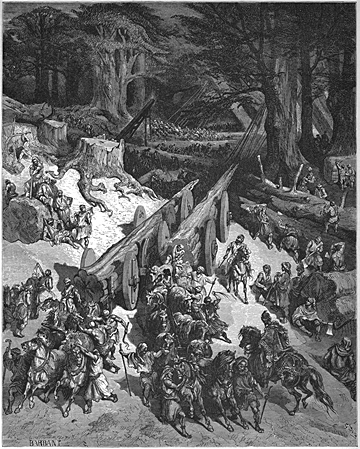1 Mpanjaka 5
1 Nirahe’ i Kirame, mpanjaka’ i Tsore mb’amy Selomò mb’eo o mpitoro’eo, ie nahajanjiñe t’ie norizañe ho mpanjaka handimbe an-drae’e; amy te nainai’e nimpirañetse amy Davide t’i Kirame.
Hiram, the king of Tyre [city], had always been a close friend of King David. When he heard that Solomon had been appointed to become the king after his father was no longer king, he sent some messengers to Solomon [to congratulate him].
2 Aa le nampihitrife’ i Selomò amy Kirame, ty hoe:
Solomon [gave those messengers] this message to take back to Hiram:
3 Fohi’o te tsy nahafamboatse anjomba ho a i tahina’ Iehovà Andrianañahare’ey t’i Davide raeko, ty amo hotakotake niariseho azeo ampara’ t’ie napo’ Iehovà ambane’ o lelam-pandia’eo.
“You know that my father David [led his soldiers to] fight many wars against his enemies in the nearby countries. So he could not [arrange to] build a temple in which we [MTY] could worship Yahweh our God, until after Yahweh enabled [the Israeli army] to defeat [IDM] all his enemies.
4 Fe tinolo’ Iehovà Andrianañahareko fitofàñe ty miariary ahy iaby henanekeo, amy t’ie tsy aman-drafelahy ndra raha mizo.
But now Yahweh our God has enabled us to have peace with all the surrounding countries. [(There is no danger that/We do not need to worry that)] we will be attacked.
5 Ingo, hoe ty volako, Handranjiako anjomba ty tahina’ Iehovà Andrianañahareko, ty amy tsinara’ Iehovà an-draeko Davidey, ty hoe: Ty ana’o hampiambesarako am-piambesa’o ty hamboatse anjomba ho ami’ty añarako.
Yahweh promised my father David, ‘Your son, whom I will enable to be king after you are no longer king, will build a temple for me [MTY].’ Because of that, I have decided to build a temple in which we can worship [MTY] Yahweh our God.
6 Aa le lilio ty hamiràñe mendoraveñe e Lebanone ao, le hindre amo mpitoro’oo o mpitorokoo vaho hatoloko ama’o ho a o mpitoro’oo ty tambe toñone’o ho a iareo, ie fohi’o te tsy ama’ay ty mahafira hatae manahake o nte-Tsidoneo.
“So [I am requesting that] you command your workers to cut cedar trees for me. My men will work with them, and I will pay your workers whatever you decide. [But] my men [cannot do the work alone, ] because they do not know how to cut down trees like your workers from Sidon [city] do.”
7 Ie jinanji’ i Kirame i saontsi’ i Selomòy le vata’e nirebeke vaho nanao ty hoe: Andriañeñe t’Iehovà henane zao, Ie nanolotse i Davide anake mahihitse hifeleke ondaty jabajaba retoañe.
When Hiram heard the message from Solomon, he was very happy and said, “I praise Yahweh today for giving David a very wise son to rule that great nation!”
8 Aa le nahitri’ i Kirame amy Selomò ty hoe: Fa tsinanoko i nañitrifa’o ahiy le hene hanoeko o satrien’ arofo’oo amo mendoraveñe naho haradrantoo.
He sent this message back to Solomon: “I have heard the message that you sent to me, and I am ready to do what you ask. I will provide cedar and cypress logs.
9 Hazotso’ o mpitorokoo boake Lebanone pak’ an-driak’ añe izay; le hamboareko t’ie hihafo amy riakey handenà’ iereo mb’amy toetse hatoro’o ahio, naho hakatrak’ añe, vaho ho rambese’o; le ihe ty hañeneke i fañiriakoy te hamahana’o mahakama ty akibako.
My workers will bring the logs down from [the] Lebanon [mountains] to the [Mediterranean] sea. Then they will [tie them together to] make rafts to float them [in the water] along the coast to the place that you indicate. Then my workers will untie the logs, and your workers will take them from there. What I want you to do is to supply food for the people who work in my palace.”
10 Aa le natolo’ i Kirame amy Selomò ze fonga mendoraveñe naho haradranto nipaia’e.
So Hiram [arranged for his workers to] supply all the cedar and cypress logs that Solomon wanted.
11 Natolo’ i Selomò amy Kirame ka ty vare-bolè ro’ale kore hamahana’e o añ’anjomba’eo, naho menake finofoke roapolo kore; izay ty natolo’ i Selomò amy Kirame taoñ’ an-taoñe.
Each year Solomon gave Hiram 100,000 bushels of wheat and 110,000 gallons of pure [olive] oil to feed the people who worked in his palace.
12 Tinolo’ Iehovà hihitse t’i Selomò, ty amy nitsarae’e ama’ey le nifampilongo t’i Kirame naho i Selomò; vaho nifanao fañina.
Yahweh enabled Solomon to be wise, just like he had promised. Solomon and Hiram made a treaty/agreement that there would be peace between their [two governments/countries].
13 Aa le hene nampitsatoha’ i Selomò haba t’Israele, ondaty telo-ale i haba zay
King Solomon forced 30,000 men from all over Israel to become his workers.
14 vaho nampihitrife’e mb’e Lebanone mb’eo, rai-ale boa-bolañe ty nifandimbe, volañe raike e Lebanone añe naho roe volañe añ’ anjomba’e ao; i Adonirame ty nifehe i hàbay.
Adoniram was their boss. Solomon divided the men into three groups. Each month 10,000 of them went to Lebanon and worked for a month there, and then they came back home for two months.
15 Fito-ale ty mpijiny kilanka’ i Selomò naho valo-ale ty namira am-bohitse añe;
Solomon also forced 80,000 men to cut stones in the hilly area and 70,000 men to haul the stones [to Jerusalem].
16 mandikoatse izay o mpifehe’ i Selomò nifelek’ o fitoloñañeoo: telo-arivo-tsi-telon-jato ty nifeleke ondatio amo fitoloña’eo.
And he also assigned 3,600 men to supervise their work.
17 Nandily t’i Selomò vaho nihaliañe vato jabajaba, vato soa, handranjiañe o mananta’ i anjombaio am-bato pinèke.
The king also commanded his workers to cut huge blocks of stones from the quarries and to smooth the sides of the stones. Those huge stones were for the foundation of the temple.
18 Aa le rinamerame’ o mpandranji’ i Selomòo naho o mpamboa’ i Kirameo naho o nte-Gebaleo irezay, naho nañalankañe o hatae vaho vato nandranjiañe i anjombaio.
Solomon’s workers and Hiram’s workers and men from Gebal/Byblos [city] shaped the stones and prepared the timber to build the temple.





















